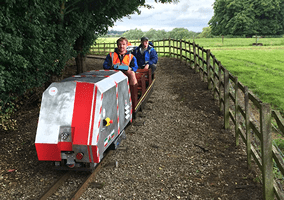Engineering students compete in UK railway challenge

Teaming up with students from England’s University of Birmingham, two graduate students from the Lee College Engineering participated in the third annual Institution of Mechanical Engineers’ Railway Challenge this summer, where they learned that building a working electric locomotive is a real challenge.
Civil engineering master’s students Ben Gorman and Matt Washing traveled to Leicestershire, England, for the event, which pitted five teams against each other in the design and construction of a 15th-scale locomotive.
The University of Birmingham team had participated in the two previous Railway Challenges and had been working on the 2014 locomotive for several months. Gorman arrived to begin working with the team several weeks before the competition.
“Everyone participated in various tasks in order to get the train put together,” Gorman said. “My primary job was writing code for the motor controller. I spent a lot of time learning the programming language Microbasic, which was a steep learning curve for me. The main purpose of the script was to make the locomotive run with inputs from a remote control that I built. In addition to the remote control, the script also controlled regenerative braking.”
The locomotives were judged on five challenges, which were the emergency breaking challenge, the energy storage challenge that involved the locomotives storing energy during braking and then using it to drive the locomotive forward again, the noise challenge, the traction challenge, and the ride comfort challenge.
Washing joined the team the week before the competition.
“At that point, my involvement in the team was a lot of manual labor for the construction of the locomotive,” Washing said. “For research relating to my own master’s thesis, I also began learning more about software that simulates the motion of a train.”
For its previous two locomotives, the Birmingham team had used hydrogen as its power source. For 2014, they decided to again go with a Hydrail locomotive.
“There are no stipulations in the rules on how you get your power,” Washing said. “You just have to have some sort of power you can transfer to an electric motor. The other teams had gasoline combustion engines. We went with the alternative fuel of a hydrogen fuel cell that charges batteries. The motors then draw their electricity from the batteries.”
The hydrogen fuel cell was a great advantage when it came to the noise portion of the competition. “With hydrogen fuel and no engine we easily won the noise challenge,” Gorman said. “No one even came close.”
The competition was held at Stapleford Miniature Railway in Leicestershire, England, which was about 90 minutes away from the University of Birmingham.